Photo by Oliver Chapin-Eiserloh
Ruby Walker is a first-year student at Trinity University, studying art and creative writing. This September, she published her first book “Advice I Ignored: Stories and Wisdom from a Formerly Depressed Teen,” a book based on her own experiences and intended to help teenagers struggling with depression.
How did you get started writing your book? How did you take your experience and decide, “I want to make a book out of this”?
Ruby Walker: Well, it was the summer of 2017, when I was 16, and basically, my entire family had noticed — and I had noticed — that a lot of big shifts had happened to me in the past couple of years. [So] I would come home, and I’d spend an hour in the front yard writing in a composition book every day. I knew that it was going to be illustrated right when I first started drafting it because there were just some parts where I wouldn’t know what to write, and I would draw a picture instead. There’s some stuff that you have to say with words, and there’s some stuff that you have to show.
How did you get through the publishing process as a young person with this transcript? Did you self-publish?
R: It’s self-published, but I did join the Writers League of Texas. In the summer of 2018, I went to an agents and editors conference, and I learned how to pitch myself to people and had this whole sort of crazy experience being 17 and in this room full of adults who are scary. But I had to learn how to talk to people about my shit. And I would say that was the hardest part about the whole navigating from doing something quietly in your own yard and your room and like writing all your really private thoughts down was learning how to make myself a website and how to pitch. I guess the big takeaway from the whole publishing side is that there is a way to balance being as authentic as you need to be with following the rules of the media.
So what made you decide to publish the book rather than keeping it private?
R: I think the goal from the beginning was to have something that I could share. That’s why I pushed through all the awkwardness of the publishing — I want young teenagers who are feeling really hopeless to have more of a representation of things going right in the world. Because when I was 14, I realized that I was depressed, and I looked around at the media landscape and saw popular media that represents teenagers with shitty mental health. I didn’t want to be the kid who died, you know. And it’s a really bleak picture to only have — like this kid was really emo and then [they] died. It’s basically the only story that I saw. I really wanted to impact the narrative and say that just because you do have all of these really difficult feelings doesn’t mean that shit is gonna be bad forever.
After all your work publishing, what has the response to your book been like?
R: This therapist in Florida who I didn’t know at all and hadn’t contacted or anything had found a quote from my book on Goodreads and put it on her Instagram page; she was trying to start a conversation with her followers about trauma. And then there were people who were saying, “Oh, I’ve always felt like this, but I hadn’t heard somebody put it into words before.” I started crying in my dorm because the whole time this is what I always wanted most of all and what I always sort of thought about in my head. If what I had written could in some way, in any way, just help one person, then all the work will be worth it.
So what are your plans for the future for this book? Any future books?
R: I have absolutely no plans for a future book. I mean, I might do it, and I probably will. And I want to, but I have no ideas right now, and I’m just focusing on this [book]. In terms of future plans, I’m working with a publicist right now who has taken a personal interest in my project because she has a 12-year-old son who’s struggling with depression right now. I’d like it to be something that’s available to people.
How would you say this could be applied to the life of a college student or someone at Trinity?
R: I wrote it with teenagers in mind, but it’s not specifically for any stage in your life, even though it is based on my experience as a teenager. Even now, I have to keep constantly reminding myself to take my own advice. Especially since recovery is not just like you do it, and then you’re done. You constantly have to work on your habits and your thought patterns, and you can easily slip into little phases of going through it again. But you constantly remind yourself of the things that you’ve learned.
Walker’s book “Advice I Ignored: Stories and Wisdom from a Formerly Depressed Teen” can be found on Amazon and other booksellers.













